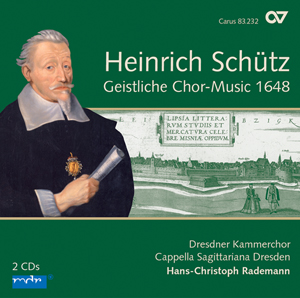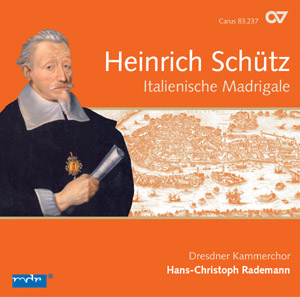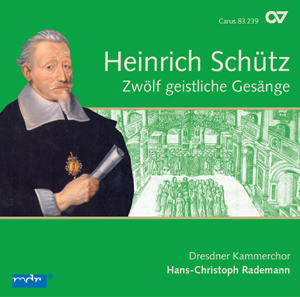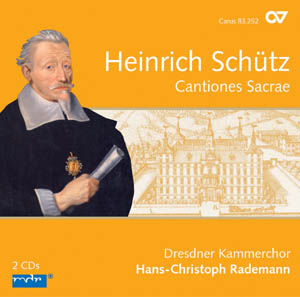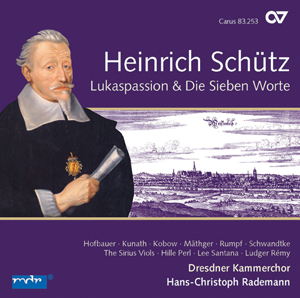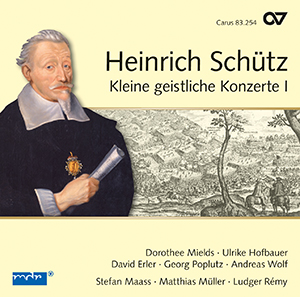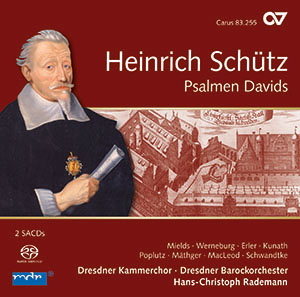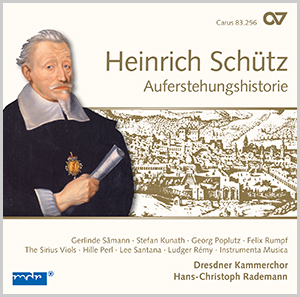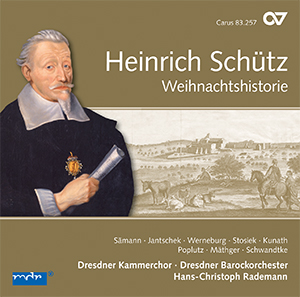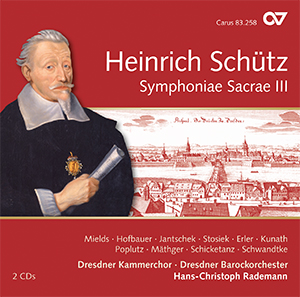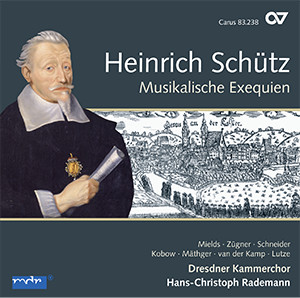
Musikalische Exequien und andere Trauergesänge. Complete recording, Vol. 3 (Rademann)
Sommaire
-
Compositeur
Heinrich Schütz
| 1585-1672Heinrich Schütz is regarded as the first German musician of European stature. As a choirboy from 1599 at the court of Landgrave Moritz of Hessen-Kassel, he received a thorough education. In 1608 he began a law degree in Marburg, but broke this off in 1609 in order, with the support of the Landgrave, to study composition with Giovanni Gabrieli, organist at St Mark’s in Venice. In 1613 Schütz returned to Kassel, but two years later was enticed away by Elector Johann Georg I of Saxony to the Dresden court as “Organist und Director der Musica”, where he held the position of Hofkapellmeister (court Kapellmeister) from 1617 until his death. Schütz’s great cycles of vocal works marked the high point of his reputation in Germany and northern Europe. But these represent only part of Schütz’s output; individual works are represented in printed collections with works by other composers, others only survive in manuscript, and much has been lost. The Stuttgart Schütz Edition makes available Schütz’s complete oeuvre, and all works are also published in practical Urtext editions. Plus d'information sur la personne
-
L'auteur de l'avant-propos
Oliver Geisler
-
Chœur
Dresdner Kammerchor
Le Dresdner Kammerchor (Chœur de chambre de Dresde) – l’un des meilleurs chœurs d’Allemagne – est bien connu pour sa sonorité unique, faite d’une grande intensité et clarté. Rayonnement dynamique, homogénéité et transparence sonores souvent cités en exemple sont les points forts de cet ensemble demandé au niveau international. Le chœur a été créé en 1985 par Hans-Christoph Rademann et des étudiants du Conservatoire de musique « Carl Maria von Weber » de Dresde. De nombreuses tournées de concerts ont établi la notoriété de l’ensemble également hors d’Europe. En ont résulté des invitations régulières à d’importants festivals internationaux. Le répertoire du chœur va de la musique de la Renaissance à des compositions du 21ème siècle. Des interprétations de la musique chorale romantique et contemporaine ont été récompensées de prix spéciaux lors de concours internationaux, ainsi que du prix d’encouragement de la fondation Ernst von Siemens. En dehors de la pratique a cappella, le chœur de chambre se consacre intensément à la coopération avec le Dresdner Barockorchester et l’ensemble « Alte Musik Dresden », donnant des impulsions importantes à la pratique de la musique ancienne en Saxe. Une foule d’enregistrements pour la radio et pour le CD, ainsi que la coopération avec des orchestres allemands et étrangers viennent renforcer la renommée du Chœur de chambre de Dresde. Le CD paru aux Editions Carus de Stuttgart, avec le premier enregistrement mondial du Requiem en mi bémol majeur de Johann Adolf Hasse s’est vu décerner le prix de la Critique allemand du disque. Plus d'information sur la personne
-
Chef d'orchestre
Hans-Christoph Rademann
| 1965Conductor Hans-Christoph Rademann is an immensely versatile artist with a broad repertoire who devotes himself with equal passion and expertise both to the performance and rediscovery of early music and to the first performances and cultivation of Contemporary Music. Born in Dresden and raised in the Erzgebirge mountains, he was influenced at an early age by the great Central German kantorial and musical tradition. He was a student at the traditional Kreuzgymnasium, a member of the famous Kreuzchor, and studied choral and orchestral conducting at the Carl Maria von Weber University of Music in Dresden. During his studies, he founded the Dresdner Kammerchor and formed it into a top international choir which is still under his direction today. Since 2013, Hans-Christoph Rademann has been the academy director of the International Bach Academy Stuttgart. He regularly collaborates with leading choirs and ensembles of the international music scene. From 1999 to 2004 he was chief conductor of the NDR Choir and from 2007 to 2015 chief conductor of the RIAS Chamber Choir. Guest conducting engagements have led and continue to lead him to the Nederlandse Bachvereniging, the Collegium Vocale Gent, the Akademie für Alte Musik, the Freiburger Barockorchester, the Deutsche Radiophilharmonie Saarbrücken Kaiserslautern, the Sinfonieorchester Basel, the Orchestre Philharmonique de Luxembourg, among others. Hans-Christoph Rademann has been awarded prizes and honors for his artistic work, including the Johann Walter Plaque of the Saxon Music Council (2014), the Saxon Constitutional Medal (2008), the Sponsorship Prize as well as the Art Prize of the state capital Dresden (1994 and 2014 respectively). He received the Preis der Deutschen Schallplattenkritik several times for his numerous CD recordings (most recently in 2016), as well as the Grand Prix du Disque (2002), the Diapason d’Or (2006 & 2011), the CHOC de l’année 2011 and the Best Baroque Vocal Award 2014. In 2016 he was awarded the European Church Music Prize of the city of Schwäbisch Gmünd. His exemplary interpretation and recording of the complete works of Heinrich Schütz with the Dresdner Kammerchor in the Stuttgart Carus-Verlag, which was completed in 2019, was awarded the newly endowed Heinrich Schütz Prize as well as the OPUS KLASSIK 2020 in the same year. Hans-Christoph Rademann is professor of choral conducting at the Carl Maria von Weber University of Music in Dresden. He is also artistic director of the Musikfest Erzgebirge, ambassador of the Erzgebirge and patron of the Christian Hospice Service Dresden. Plus d'information sur la personne
-
Solist - soprano
Dorothee Mields
-
Solist - soprano
Anja Zügner
Soprano Anja Zügner received her first singing lessons at the age of 17. She completed her vocal studies at the Hochschule für Musik “Carl Maria von Weber” in Dresden in 2010. She has continued her studies, attending master classes with Kammersänger Peter Schreier, Ruth Ziesak, Gerold Huber and Ludger Rémy. As a lieder and oratorio singer, she has performed with Konrad Junghänel, Wolfgang Katschner and Hans-Christoph Rademann. Anja Zügner is a scholarship holder of the German Academic Exchange Service (DAAD), the Forum Tiberius and the Carl Maria von Weber Scholarship. Plus d'information sur la personne
-
Solist - contraténor
Alexander Schneider
Alexander Schneider (altus) was a member of the Dresdner Kreuzchor from 1987 until 1996. From 1997 he studied under Peter Herrmann at the Hochschule für Musik “Hanns Eisler” in Berlin, obtaining his singing diploma in 2004. He has sung with numerous renowned conductors and ensembles including the Collegium Vocale of Ghent and the Akademie für Alte Musik Berlin, as well as the Dresdner Kreuzchor. He made a successful opera debut in 1999 at the Neukölln Opera, Berlin, in Johann Adolf Hasse’s Commedia per musica La Sorella amante. His work is documented on many CD and radio recordings. Plus d'information sur la personne
-
Solist - ténor
Jan Kobow
-
Solist - ténor
Tobias Mäthger
Tenor Tobias Mäthger studied singing, conducting and school music in Dresden and works as a freelance singer, conductor, teacher and church musician. He has already achieved considerable success with a varied concert career both nationally and internationally. He is a member and soloist with the Dresdner Kammerchor, as well as a member of the soloists’ ensemble of the Musik Podium Stuttgart under Frieder Bernius. In addition, he regularly works with leading artists and ensembles including Marc Minkowski, Rafael Frubeck de Burgos, Dresden Staatskapelle, the Dresden Philharmonic Orchestra, Bremer Kammerphilharmonie, Dresdner Kreuzchor, Rheinische Kantorei and many others, as a soloist or as a conductor’s assistant. Plus d'information sur la personne
-
Solist - basse
Matthias Lutze
Bass-baritone Matthias Lutze received his first musical training in the Dresdner Kreuzchor and Windsbacher Knabenchor. He studied singing in Dresden with Christiane Junghanns and Olaf Bär. He has also been considerably influenced by Charlotte Lehmann, Norman Shetler and Peter Kooij. He performs with leading ensembles such as the Collegium Vocale Gent, RIAS Kammerchor, Lauttencompagney Berlin and is a frequent guest at major music festivals including the Handel Festival in Halle, the Festival de Saintes, Dresden Music Festival and Prague Spring Festival. Matthias Lutze sings with conductors such as Philippe Herreweghe, Hans-Christoph Rademann, Daniel Reuss, Marcus Creed, Iván Fischer and Helmuth Rilling, and has performed in highly-acclaimed CD and radio recordings. Plus d'information sur la personne
-
Solist - basse
Harry van der Kamp
Harry van der Kamp (baryton-basse) a accompli sa formation vocale à Amsterdam et a acquis une renommée notamment dans le domaine de la musique baroque. Il s’est produit avec des chefs tels que Gustav Leonhardt, Nikolaus Harnoncourt, Ton Koopman, William Christie, Sigiswald Kuijken, Franz Brüggen, René Jacobs, Philippe Herreweghe et Jos van Immerseel. Il a interprété plus de 30 rôles dans des opéras européens et américains, de Monteverdi à Mozart, sans oublier la musique de notre temps. Avec le Gesualdo Consort Amsterdam qu’il dirige, il va enregistrer dans les prochaines années l’intégrale de l’œuvre vocale du compositeur néerlandais Jan Pieterszoon Sweelinck. Il occupe une chaire de professeur au Conservatoire de musique de Brême depuis 1997. Plus d'information sur la personne
-
Solist - orgue
Ludger Rémy
The harpsichordist/pianist and conductor Ludger Rémy († June 2017) felt an obligation to meet the challenge set by the theorist Mattheson to combine theory and practice. He studied school music and harpsichord in Freiburg, followed by private studies with Kenneth Gilbert in Paris. In 1998 he was appointed to a professorship for early music in Dresden. Around 70 CD productions – several have been awarded prestigious prizes – both as instrumentalist and conductor, as well as numerous concerts at home and abroad (at festivals incl. Utrecht, Brügge, Paris, Saintes, Bachfest Leipzig, Händelfestspiele Göttingen, Musikfestspiele Dresden) made him one of the leading musicians active in the rediscovery and revival of early German music. Plus d'information sur la personne
-
Solist - violone
Matthias Müller
Matthias Müller works as a freelance musician in Freiburg im Breisgau. Since completing his studies he has pursued a busy international concert career, including performing on numerous CDs. The range of instruments he plays encompasses all of the gamba family, including various types of violone, and the lyra da gamba. Since 2000 he has been a permanent member of the ensemble Cantus Cölln, and also works together with various other leading ensembles and conductors. Plus d'information sur la personne
Critiques
Alles in allem bietet diese CD ein eindrucksvolles Programm, und es könnte sich als eines der interessantesten Folgen dieser Schütz-Edition herausstellen.
Toccata, 1/2013
The performances are impressive: the choir does all the right things. […] well worth buying.
Early Music Review, Juni 2012
[…] throughout the disc, the choir’s expertise with this style is self-evident and the Radeberg church acoustic serves the music like a tailor-made suit. It is expertly captured by the Carus engineers. […] This disc deserves to win more fans for Rademann’s great project, as well as for the composer himself.
Simon Thompson, musicweb-international, Juni 2012
The performance by the Dresdner Kammerchor, under Hans-Christoph Rademann, is superb. Diction and dynamic shading are uniformly excellent. The continuo playing (violone and organ) is subtle and effective. A high point is the choir’s blend, with a beauty, lightness, and clarity of tone well suited to Schütz’s music.
Mark Falk, Choral Journal, Juni/Juli 2012
This much-recorded work receives as fine an interpretation as I can recall. […] By eschewing drama in favour of interiority, Rademann's ensemble also achieves something rather special. […] A very fine continuation to an impressive series.
Fabrice Fitch, Gramophone, May 2012
Dies ist keine CD für die Hintergrundbeschallung. Was der Hörer hier geboten bekommt, ist Musik und Interpretation auf höchstem Niveau.
Musica Sacra, März/April 2012
Hans-Christoph Rademann gehört zu den herausragenden Chormusikern im deutschsprachigen Raum. […] Die Leichtigkeit und Homogenität der Stimmen bringt Schütz' stark vom Text inspirierten Chorsatz schön zum Leuchten. Vier Ersteinspielungen machen die CD zur Referenzaufnahme.
St. Galler Tagblatt, 21. März 2012
[…] Vokalsolisten, der Dresdner Kammerchor und Instrumentalisten unter der Leitung von Hans-Christoph Rademann erweisen sich als intellektuell wie emotional engagierte Interpreten, unübertrefflich in Inspiration, Klangschönheit und Ausgewogenheit, auf das Gleichgewicht von Wort und Musik, von Textklarheit und melodisch-harmonischer Ausdrucksdifferenzierung bedacht.
www.codexflores.ch, 7. März 2012
I was immediately struck by the beautiful vocal sound, subtle shaping and an organist […] who knows exactly how long to hold a note. […] Buy it!
Early Music Review, Februar 2012
Schützens Trauergesänge sind Teil einer Gesamteinspielung mit dem Dresdner Kammerchor sowie ausgezeichneten Gesangssolisten unter Leitung von Hans-Christoph Rademann. Das Ergebnis stimmt alles andere als traurig. Denn die Dresdner machen nach den Kriterien der historischen Aufführungspraxis alles richtig. Besonders beeindruckend die organischen Wechsel zwischen Chor und Gesangssolisten.
Mannheimer Morgen, 1. Dezember 2011
Neben einer auch von den Solisten stimmig getragenen beispielhaften Interpretation der "Musikalischen Exequien" sind es vor allem vier von fünf weiteren Trauergesängen, die die Aufnahme besonder machen, handelt es sich doch um bislang nicht eingespielte Werke. Der Kammerchor brilliert in der Super-Audio-Aufnahme mit reiner Klangschönheit, die Deutung betont Zuversicht.
Dresdner Neue Nachrichten, 12. Dezember 2011
Klanglich bleiben bei dieser hybriden SACD keine Wünsche offen: Exquisit erwärmt, zugleich konturstark und in expliziter Staffelung realisiert, gelingt vor allem eine schöne Balance von Chor und Soli. […] Ein diskographisches Schwergewicht ist die Platte […] allemal – natürlich wegen der Qualität ihrer Interpretation, vor allem aber, weil die Musikalischen Exequien mit teils erstmals eingespielten Kompositionen programmatisch schlüssig gerundet wurden.
Dr. Matthias Lange, klassik.com, 23. November 2011
In der tiefen Interpretation des Ensembles erweist sich Schütz einmal mehr als der Großmeister der Verknüpfung von biblischem Wort und musikalischer Rhetorik. Die dritte CD einer geplanten Gesamteinspielung schließt an die beiden vorangegangenen auf einem Niveau an, das die Reihe wohl zur neuen Referenz-Einspielung machen wird. Eine solche Aufnahme macht neugierig auf mehr.
Michael Klein, Glaube und Heimat - Mitteldeutsche Kirchenzeitung, 13. November 2011
Questions fréquentes sur l'œuvre
 Il n'y a pas encore de questions et réponses concernant cette œuvre ou vous n'avez pas trouvé la réponse à votre question sur l'œuvre ? Cliquez ici et envoyez votre question spécifique à notre service clients.
Il n'y a pas encore de questions et réponses concernant cette œuvre ou vous n'avez pas trouvé la réponse à votre question sur l'œuvre ? Cliquez ici et envoyez votre question spécifique à notre service clients.





